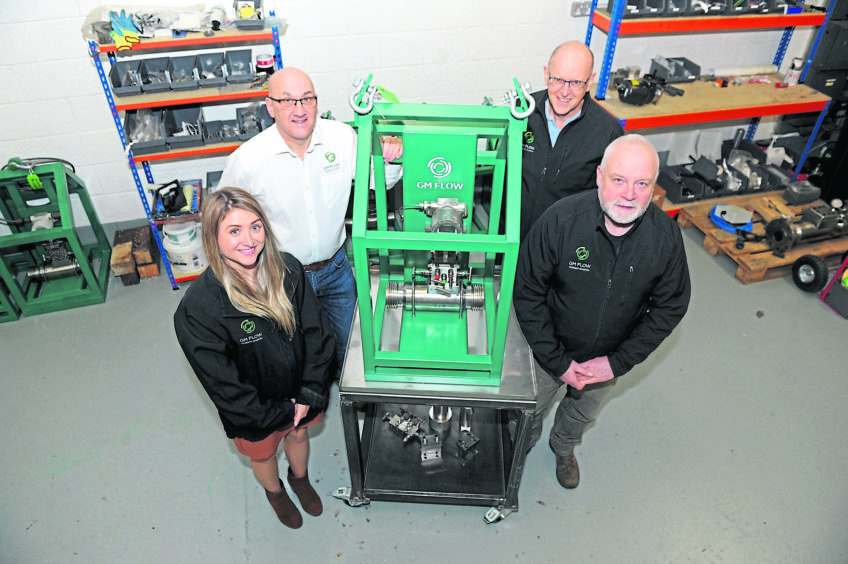
Bosses at Aberdeenshire company GM Flow Measurement Services are applying their many decades of experience in the oil and gas industry to an “energy revolution” by diversifying into hydrogen.
GM Flow’s technology measures produced natural gas during onshore and offshore operations, and helps to stop potentially dangerous releases.
The Ellon-based firm was recently boosted by a £165,000 grant, which was awarded through a UK Research and Innovation (UKRI) Industrial Strategy Challenge Fund programme.
UKRI’s Prospering from the Energy Revolution initiative aims to unlock the potential of intelligent energy systems by funding business and researchers to work together to show how new technologies can deliver cleaner, cheaper, investable energy, while also creating high-value jobs across the UK.
GM Flow, whose management team boasts more than 120 years of oil and gas operations experience, is using its cash to study advanced sealing mechanisms, which will be required for developing a flow meter for hydrogen applications.
Founder Gavin Munro said the company’s diversification into hydrogen reflected the oil and gas industry’s need to innovate and adapt in the race to net-zero carbon emissions.
“The Aberdeen area is full of innovators like us,” he said, adding there was now an opportunity to use the region’s skills and experience – including from among those people who have “made a fortune out of oil and gas” – to full effect in the “energy revolution”.
When GM Flow launched in 2014 it was wholly focused on the oil and gas industry. It recently recruited North East Scotland College and Aberdeen University mechanical engineering graduate Chloe Grigor to its small team to lead work on hydrogen.
Mr Munro said the firm was laying the foundations for life beyond oil and gas.
He added: “What happened to steam train manufacturers when diesel train technology was emerging?
“There was a rush of innovation to try to make steam trains more efficient.
“GM Flow is not interested in innovating to maintain the status quo. We see a great opportunity to join the band of pioneers transitioning to the new sustainable energy economy.
“Where north-east Scotland found itself well-placed to respond to the oil boom of the 70s, we are now well-placed to respond to the green transition.
“Scotland has a huge resource in offshore wind for green hydrogen, and north-east Scotland has infrastructure through St Fergus to produce blue hydrogen (from natural gas). Aberdeen has bold plans to become a hydrogen city and there are other communities – Orkney, the Moray Firth, Dundee and Fife – that are leading the way too.
“Some businesses, such as Pale Blue Dot and Areg (Aberdeen Renewable Energy Group), have been ploughing a lonely furrow for many years, but their moment has come and we’re keen to progress with them in the hydrogen arena.”
Mr Munro said GM Flow had connected with “key players and influencers” over the past six months to help make a hydrogen-fuelled future a reality and to see what part it can play to fill technology gaps and help bring proven ideas to market.
He added: “We now wear two hats. We’re old hands at oil and gas, and battling the challenges that nature throws at us – high pressure, low pressure, variable flow etc – and we’re keen novices in hydrogen, where we are eager to learn, contribute and grow.
“We’ve freshened up our team by employing a young graduate mechanical engineer and she will be a key resource within our UKRI-funded hydrogen flow meter development project.
“This is to solve the challenge of accurately and reliably metering hydrogen gas flow, which is a known technology gap.
“We plan to attract other focused and motivated individuals to join our team.
“We’re actively building our network, knowledge and influence by connecting with those already active in the hydrogen sector.
“We are carving out our niche and encourage other innovative businesses to do the same. This is a chance for the north-east to lead a path to a cleaner, greener world economy.”
Recommended for you
